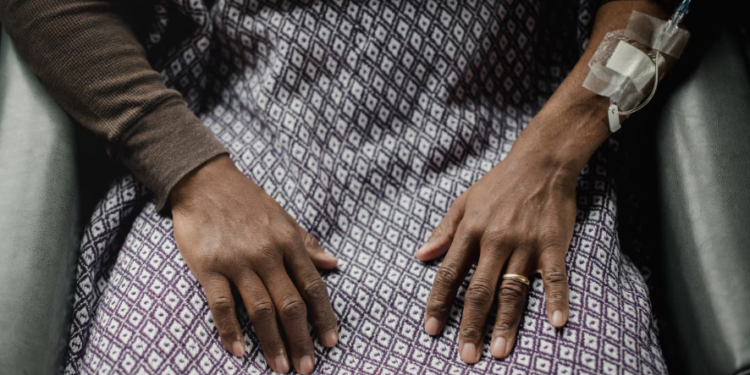Dec 27, 2024 Story by: Editor
Older Black and Latino Individuals Face Higher Alzheimer’s Risk Despite Medical Advances
Despite recent advancements in Alzheimer’s disease treatment, older Black and Latino individuals are significantly more likely to be diagnosed with Alzheimer’s than their white counterparts. Efforts are being made to address this disparity.
Althea Jordan, who lives in suburban Des Moines, Iowa, sits in her white recliner as her physical therapist, Danielle Heltzel, works with her on a series of leg exercises.
“Did I ask if your knees hurt? Are they sore? They ache?” Heltzel inquired.
Jordan softly confirms some discomfort in her legs. At 73, she is in the late stages of Alzheimer’s and also recovering from a recent virus, making her quieter than usual.
Jordan, an African American, resides in a townhouse with her son and daughter-in-law, Milinda Andrews, who serves as her full-time caregiver.
Andrews recalls the first sign of memory loss in her mother-in-law more than ten years ago when she went to pick Jordan up from the bus stop.
“I drove up to pick her up and I saw her waiting, and she didn’t recognize me right away. It was just seconds, but it was a blank couple seconds,” Andrews said.
From there, Jordan’s symptoms worsened. She began mixing up her medications, and her children had to check on her more frequently at her independent living facility. Eventually, Jordan even forgot to go to work.
Andrews insisted that her husband’s family take Jordan to the University of Iowa for a diagnosis, where she was confirmed to have Alzheimer’s.
“It was pretty much me at this point, kind of going out in front and taking charge and trying to find out those answers. What if I wasn’t there?” Andrews shared. “And it goes back to, you know, different cultures, different families, how they handle things.”
According to the Alzheimer’s Association, an estimated 6.9 million Americans aged 65 and older are living with Alzheimer’s, and that number is expected to rise to 12.7 million by 2050. While treatments are now available that can help slow the disease’s progression, Black and Latino populations, particularly in the Midwest, often miss out on these benefits.
Cultural Factors and Lack of Trust in Healthcare
In addition to genetic risk factors, conditions such as poor diet, lack of exercise, stress, diabetes, and hypertension—more common among Black and Latino communities—contribute to a higher likelihood of developing Alzheimer’s. Older Black and Latino individuals are about 1.5 to 2 times more likely to be diagnosed than their white peers.
A common misconception in Black and Hispanic families is that memory loss is simply a part of aging, which can delay a diagnosis. Jimmy Reyes, founder of MiSaludIowa, a non-profit organization focused on underserved communities, explains this cultural factor.
“Many times people think, ‘Oh, you forgot about your keys, or you forgot…how to get to one location.’ And they don’t see that as a warning sign that, if it’s cumulative, and if it happens for so long, that could be perhaps a sign that there’s something else going on,” Reyes said.
Reyes has collaborated with healthcare providers and community health workers to address this issue through screening events, aiming to raise awareness.
Dr. Yogesh Shah, medical director of the memory clinic at Broadlawns Medical Center in Des Moines, has been working to raise awareness about Alzheimer’s in Black and Latino communities for over seven years. He noticed that the clinic had far fewer patients of color compared to the overall patient population, prompting him to take action.
Some of the hesitation stems from the systemic racism that minority groups experience in the healthcare system, Shah explains.
“There’s less trust amongst African Americans to go to a medical system and go and talk about their health issues, especially mental health and dementia,” Shah said. “We are intentionally trying to go to the communities, rather than asking community members or patients to come to the clinic.”
The Importance of Early Diagnosis and Awareness
One of Shah’s key goals during these community events is to offer brief screening tests to identify individuals showing early signs of Alzheimer’s. Early diagnosis is crucial, as recently approved drugs can slow the progression of the disease if detected in its early stages.
“If we don’t catch it early, that doesn’t mean we are avoiding the issue, just the issue gets delayed,” Shah said. “And more Latino, more African Americans, tend to come to the emergency room in our hospitals with memory related issues…because they don’t know what’s going on.”
Experts emphasize that including diverse groups in Alzheimer’s drug trials is essential for developing treatments that work across populations.
Dr. John Morris, a neurology professor at Washington University School of Medicine in St. Louis, notes that most Alzheimer’s drug trials still predominantly feature white, college-educated participants.
“If we only study Alzheimer’s disease in white people, we’ll only learn about Alzheimer’s disease in white people,” he said.
Morris further explains that new Alzheimer’s drugs target amyloid plaque in the brain, thought to be a contributing factor to the disease. However, studies have found that Black individuals may be less likely to have amyloid plaque than white individuals, making the drugs more effective for white patients.
“We have no real data to understand, for example, whether a drug exerts the same benefit in people identifying as Black as it does in people identifying as white, nor do we know whether there are differences in side effect profiles,” Morris said. Source: LPM
















